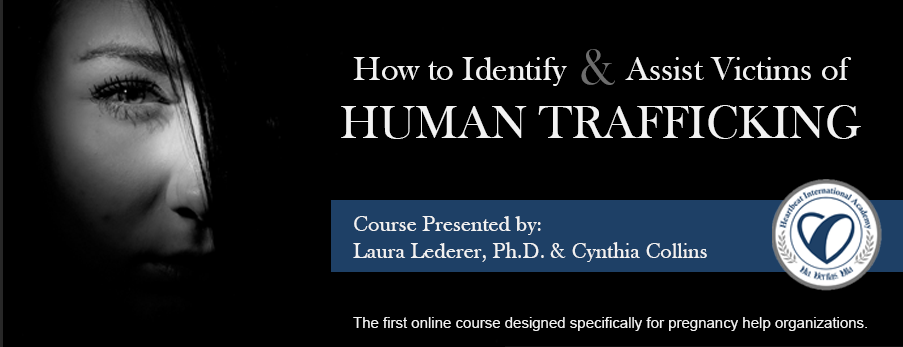(Pregnancy Help News) Last week, pregnancy help centers were handed a new educational tool in the unceasing fight to eradicate human trafficking and restore dignity to victims around the world.
Heartbeat International—a global network of over 2,600 affiliated pregnancy help centers—launched the first-ever online course designed to help pregnancy centers assist victims of human trafficking on Tuesday.
The course, How to Identify and Assist Victims of Human Trafficking, is available through Heartbeat International Academy, an online educational platform which currently serves over 4,500 active students from pregnancy help centers around the world.
“Pregnancy help centers are vital first responders to this modern slavery,” said Betty McDowell, LAS, senior director of ministry services for Heartbeat International. “Drawing on expert research and stories from pregnancy centers with hands-on experience, this course equips centers to appropriately respond to this dangerous and dehumanizing practice, and to affirm the lives and dignity of victims in need.”
READ: If Planned Parenthood cared about women, it would report forced abortions and trafficking
With the help of human trafficking experts Laura Lederer and Cindy Collins, Heartbeat International developed its new course to better equip pregnancy help centers to understand what human trafficking is, how to identify its victims, and how to respond appropriately.
The training uses case studies, relating material to everyday applications in pregnancy help centers and helping staff understand how they may encounter trafficking in their day-to-day work.
“While there are other trainings available, Heartbeat International’s training is the first one tailored for pregnancy resource centers and pregnancy helping organizations,” said Laura Lederer, president of Global Centurion, a non-profit organization fighting human trafficking. “It uses actual case studies from PRCs in the U.S. where trafficking victims have been identified and assisted, and tailors the training for PRCs. This is important work that saves two lives: the life of the mother (who is saved from trafficking) and her child.”
Though typically known for their efforts to help women choose life when faced with an unplanned pregnancy, pregnancy help centers serve clients from a wide array of life circumstances that require specialized care and support.
Often that means helping clients navigate a host of issues that go beyond a positive (or negative) pregnancy test.
Human trafficking is one such issue, as approximately 71 percent of survivors report becoming pregnant at least once during the time they were trafficked, according to Lederer’s research.
In the first-ever study of the health consequences of trafficking, Lederer also found that of survivors:
- 21.2 percent got pregnant 5 times or more
- 55.2 percent reported at least one abortion
- 29.9 percent reported multiple abortions
Of those who answered the questions about abortion, over half said that the abortion was forced by the trafficker, and just over two-thirds had the abortion(s) performed at a clinic. According to Lederer, survivors said that traffickers threatened the lives of victims if they became pregnant, using intimidation as a tactic to force abortions.
Furthermore, about 87 percent of trafficked victims have had contact with a health care provider while being trafficked. Those providers can include pregnancy centers.
With such a high likelihood of making contact with a human trafficking victim, pregnancy centers are in prime position to respond and make an impact on the devastating practice.
In fact, there is at least one instance where a pregnancy center served as a key ally in helping break up a whole human trafficking ring.
READ: Where can pregnant rape victims and prostitutes get help? Pregnancy centers.
“It is critical that pregnancy resource centers train their staff and volunteers,” says Lederer. “Traffickers bring their victims to PRCs for many reasons: PRCs offer free ultrasounds, and they have an open door policy and lower thresholds for serving pregnant women than emergency rooms in hospitals and even most clinics. This means that pregnancy resource centers are ‘first responders’ and need to be trained to identify trafficking victims and respond appropriately.”
McDowell is hopeful that Heartbeat International’s new course will give life to more stories like this.
“The goal of this course is to empower centers to serve women and their unborn babies even in the darkest of circumstances,” she said. “Because human trafficking involves layer upon layer of abuse, a loving, careful, and well-trained approach is necessary to lift those layers and help free women and their children from that darkness.”
To learn more about the course or to purchase it, click here.
Editor’s Note: This article was originally published at Pregnancy Help News and is reprinted here with permission.








